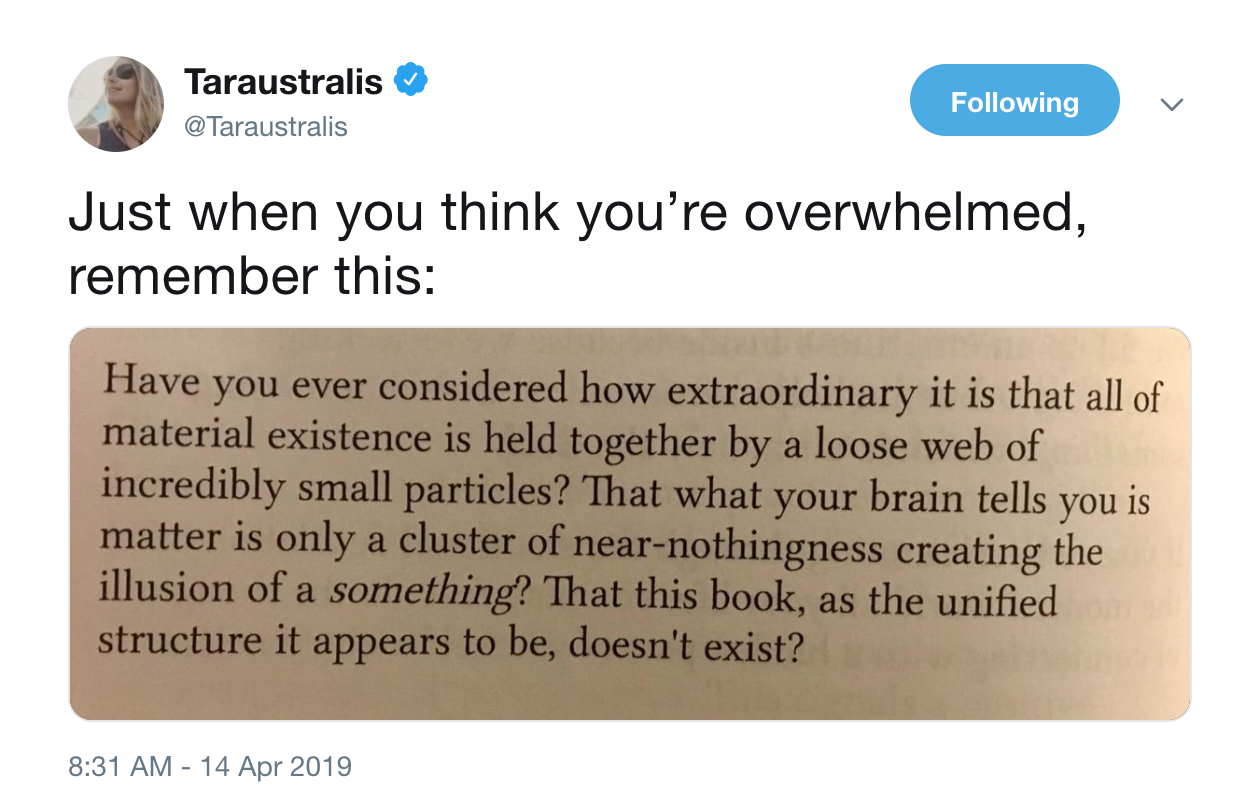Holding Us Together: The Power of the Essay

On Sundays when I don't climb, I read. It's the least I can do for my mind. To sit outside a café, turn my face to the sun, and turn my mind to the epiphanies of others.
Today I selected a volume of essays because essayism continues to be my favorite genre and form.
Essays have underscored my life. They run to a rhythm that resonates with my own modes of thought and expression. My MFA thesis at Lesley University, Meditating on the Cold Light (2012), was a series of personal essays on my first year of life abroad. My MA thesis at the University of Oslo was an examination of The Metaphysics of Ecofeminist Essayism (2017), in which I studied the perspectives and contributions of Terry Tempest Williams and Rebecca Solnit. I am endlessly fascinated by the way humans make sense of the world, holding bits and pieces of history and personal experience up to the light and sensitively stringing them together. That's essayism. Turning bread crumbs in the woods into a trail home.
This is why I read them. This is why I write them.
The Best American Essays of 2018 opens with a foreword by Editor Robert Atwan considering the foundations of essayism built in the time of Montaigne (1533-1592). One of the preeminent philosophers of the French Renaissance, Montaigne retired from public life in his late thirties, cloistered himself on his family's estate, and spent the rest of his life building out a library, thinking and writing. Atwan notes:
Montaigne's was a mind filled with doubt. His genius evolved with his writing and it essentially consisted in making doubt a source of creativity, not an intellectual liability or a spiritual affliction.
Doubt is the wellspring of the essay. We write to know what we think, to know how we think, to uncover our own mistakes, to clarify our logic and give space to our worthy emotions. The result is something that seems organic, wild even. A jungle of tightly woven trains of thought. But pliable, penetrable, parsible. Inviting.
The trick is to realize from the beginning that the narrative arc adheres entirely to the essayist's perspective. In the best essays, the fragments of life and information highlighted by the essayist seem eclectic, almost random, dissonant. It is a treasure hunt, and the reader must collect the pieces as she goes along, faithfully, trying to pick up the resonance she knows will be there by the end. A resonance discovered and documented by the first one though this terrain: the essayist.
Atwan's foreword to the 2018 collection is an essay that begins inside the Château de Montaigne. The author moves briefly through the history of that estate--purchased by the famed essayist's great-grandfather in 1477; inherited by Montaigne in 1571--to Montaigne's writing process: always in motion, pacing and dictating his thoughts to someone else. To doubt as a creative fount. To Montaigne's allegiance to skepticism and ataraxia, "a mental state of tranquility and imperturbability" achieved by the pure suspension of judgment required to allow the clash of conflicting opinions in one's own brain and equally exploring them both or all.
Atwan jumps then to Emerson, a more recent skeptic, whose skepticism manifested in a more optimistic view of the world and one's own agency to live a good life. For Emerson, too, the essay was about exploring his own thoughts and offering a possible logic to make sense of a world where "knaves win in every political struggle... and the march of civilization is a train of felonies, yet, general ends are somehow answered." Here, Atwan turns to the major contradiction of skepticism: that "to say that knowledge consists of knowing that nothing can be known for certain is to express certainty."
I begin to pick up the resonance. I am asking one of the same questions that occurred to Atwan as he wrote his foreword. What does this contradiction mean for the essay as a form?
His suggested answer:
What to me is most important from a literary and philosophical point of view is the extent to which Montaigne created the essay as an exercise in self-scrutiny and free inquiry... The essays were forms of expression new to the world and for centuries they characterized what it is like to possess an open and inquiring mind.
At the café this morning, I sat among a crowd of Norwegians attuned to the sun. Cigarette smoke wafted over the group and I didn't mind at all. Though I've never smoked, the subtle taste of it on the breeze gives me a moment with Hemingway or Joan Didion. My subconscious slices the the adverbs from my internal monologue. My sweater is red. Cappuccino foam is white in the white cup.
Everything is connected. Everything is a pattern, emblematic of something larger and something smaller existing simultaneously in the infinite universe. Though it is not present in Atwan's essay, I feel the word fractal reverberate in my brain.
Fractal: a curve or geometrical figure, each part of which has the same statistical character as the whole.
I don't yet understand why Robert Atwan opened Best American Essays of 2018 with an exploration of Montaigne and skepticism. Why he chose to highlight the definition of the essay as an emblem and practice of an open mind. But I know these things are connected, not only to each other, but to the context. The essays that will comprise this collection are variations on a theme that revealed itself to Atwan as he read through the collection: That we need more open and free minds in this world.
Because, "if we don't continually test even our firmest beliefs and opinions, they will calcify into unquestioned dogma."
Calcification is the enemy of an open and inquiring mind. It accumulates and blocks and obstructs. It kills. And it is a danger at both ends of the political spectrum. As Atwan points out:
In an increasingly polarized society, skeptical free inquiry can easily lead to slippery slope conclusions: you contemplate X or Y or Z, and the next thing you know, you're a bigot, a communist, or a Nazi. For a moment you pace back and forth in your room essaying, and suddenly the reputed tolerant are no longer tolerating.
This twist in Atwan's narrative is about the way that constricted thought processes trigger the human tendency to quickly categorize others based on behavior and beliefs, locking them into a broad definition. Because that's easier than accepting the fluidity of reality. Less fatiguing than knowing these categories are a human construct. That difference and even division begin at an atomic level.
Before departing for the café this morning, I wasted roughly fifteen minutes on social media, hopping between Instagram, LinkedIn, and Twitter. (I've recently abandoned Facebook, joining a mass exodus of other disenchanted 20-and-30-somethings who want our privacy back). Scrolling through my Twitter feed, I saw this:

Another thing I find fascinating: That a loose web of incredibly small particles makes my cappuccino foam, my red sweater, The Best American Essays of 2018, my husband and daughter, me. And the universe is infinitely expanding. Is it any wonder that the world sometimes feels it's about the fly apart at the seams?
The human mind is an incredible thing. When we try, when we really focus and train to achieve it, the human mind can accommodate any number of massive contradictions. As I wrote after the Women's March in 2017:
I can say, 'I understand' without saying, 'I agree.' And I can say, 'I disagree,' without saying, 'I don't understand.' We're too quick in our speed-dating, Snapchat, 140-character culture to divide along these lines. These things shouldn't be mutually exclusive. Understanding comes with intelligence and experience. It does not require agreement. And it does keep the conversation going. Open mindedness is not gullibility, but we often act like it is. Easier to shun the thing we don't understand than to sit down and ask questions about it. Discernment takes too long.
We need the essay as a form and we need it to rise to the occasion of this epoch. Because we're feeling our basic division in our very bones. Because tempers are running shorter than attention spans. Because the universe is expanding and it is infinite.
I can't be sure this is what Atwan wanted me to feel as I turned the final page of his foreword, but I guarantee that he wanted me to feel something. That's essayism. It's a genre that is meant to move you. Not the way fiction does, to laughter or tears. But to action. In my UiO thesis, I tried to discover the way ecofeminist essayists used different techniques to pass the energy of their ideas from the void through the page to their readers to be turned into actions. Not sure I pulled it off, but it was a grand attempt.
After all, it must be true. How else can you explain the way Atwan's essay led to this one? The first long-form personal content I've made public in years. That's either magic or metaphysics. That's the power of the essay.